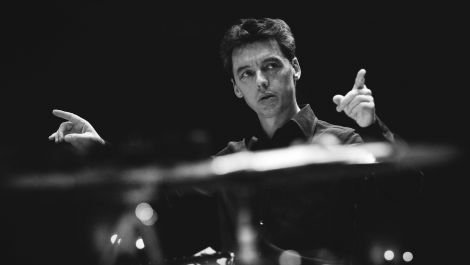Reviews / Review: a concert not for the lighthearted
SHETLAND Arts’ 2016/17 classical season has, so far, been bold and uncompromising, with Shetland-born virtuoso Neil Georgeson at the helm of a series of characteristically unorthodox concerts. Saturday night saw the critically acclaimed Hebrides Ensemble take to the stage to put their own mark on the season, writes Alex Garrick-Wright.
The concert was, boldly, comprised of just four pieces, all arranged for clarinet, piano and cello. Such a small selection of music makes the need for careful curation and programming all the more essential; just one or two pieces missing the target risks upsetting the balance of the entire concert.
Cellist and Ensemble Artistic Director William Conway introduced the first of the four: Fantasy on an American Hymn Tune by Yorkshire composer Kenneth Leighton. The composition, Conway explained, was based on an old hymn called At the River, snippets of which recur throughout.
Fantasy was a dark, foreboding piece, heavy on low bass tones with an uncomfortable dissonance from the piano. Extremely dramatic and slightly eerie, Fantasy sounded very much like the soundtrack to an old, black and white thriller.
By the end, the music slowed to a crawl, the piano dissonant as the cello mourned in accompaniment, filling the room with an uneasy atmosphere before dying slowly away on a sombre note,
Next up was Debussy’s Premiere Rhapsodie for clarinet and piano, originally written as an entry for a competition at the Paris Conservatoire and one that became a favourite of Debussy and, indeed, Conway as well.
A clarinet-and-piano composition, Premiere was a bit of a musical journey that started slow and soft before becoming wistful and ever so slightly sad. Soon enough it rallies, the piano picking up speed and turning the piece into something dark and rumbling, before briefly lightening up, and ending on a big dramatic finish from the piano.
Become a member of Shetland News
At this point there would normally be an interval; the music ended, the applause rose and fell, and the musicians left the stage. A couple of moments later, clarinetist Yann Ghiro hesitantly returned due to some confusion as to whether there was an interval or not. Ghiro deferred the decision on this to the audience, who encouraged the musicians to skip their cup of tea and continue on with the concert. “Thank you for waiting,” Conway quipped as he picked up his cello, his tea abandoned in the Green Room.
Conway then introduced Espace 1 for cello and piano by ‘underappreciated’ Korean composer, activist, political prisoner and accused spy Isang Yun: “I still can’t understand why he’s not better known.”
This was described as the ‘crux’ of the programme as Yun’s combination of Eastern and Western musical traditions creating an unusual and unique sound; Conway made special mention of Yun’s ‘bending pitch’, a technique inspired by Chinese and Japanese flutes that makes the instruments ‘groan’.
Espace certainly did have a unique sound, a technically intricate piece that had the cello alternating between a nervous quavering and the aforementioned groaning, accompanied by a piano that was gently tinkling, threatening and eerily discordant in turn. At times it was as if the cello and piano were playing very different compositions. By the end, the music was just meandering around with sporadic bursts of life, before simply ending. Interesting, but not particularly enjoyable.
There was no introduction for Francis Poulenc’s Trio arranged for clarinet, cello and piano. A much more palatable piece of music; playful and jaunty with little dramatic interjections, like the chase music from an old BBC sitcom.
The second movement was a far more full-bodied affair, slow and rich, building itself up before ending on a wandering, thoughtful note. The third movement was a wonderfully light, playful piece; an infectious and joyous bit of music with a stirring martial interlude that evoked a real sense of childlike adventure. Trio was a masterfully played delight, and the sure highlight of the concert.
The encore was German composer Max Bruch’s Nachtgesang (‘Night’s Song’). A sonorous and sad piece, with occasional moments of energy that did little to lift the atmosphere. All the good feeling instilled by Poulenc was washed away by the sleepy and melancholy tones of Nachtgesang, which became more and more sedate towards the end, as if the music itself was ready to head to sleep.
Then it was over; with the interval skipped, the concert was barely an hour-and-a-quarter long.
The music was played excellently, and the Hebrides Ensemble’s ability was as good as reputed. However, the programming was problematic – a concert with only four pieces should really try to avoid three of them being so downbeat.
The skipped interval meant that the concert was frustratingly brief, while the sad encore brought the mood back down after the more affirming Poulenc finale, and left the audience lulled instead of elated.
Ultimately, the unbalanced and weighty programme overwhelmed the musicianship, resulting in a somber experience; hopefully the upcoming concert by Mr McFall’s Chamber Orchestra in April will be more uplifting.
Become a member of Shetland News
Shetland News is asking its readers to consider paying for membership to get additional perks:
- Removal of third-party ads;
- Bookmark posts to read later;
- Exclusive curated weekly newsletter;
- Hide membership messages;
- Comments open for discussion.
If you appreciate what we do and feel strongly about impartial local journalism, then please become a member of Shetland News by either making a single payment, or setting up a monthly, quarterly or yearly subscription.





























































